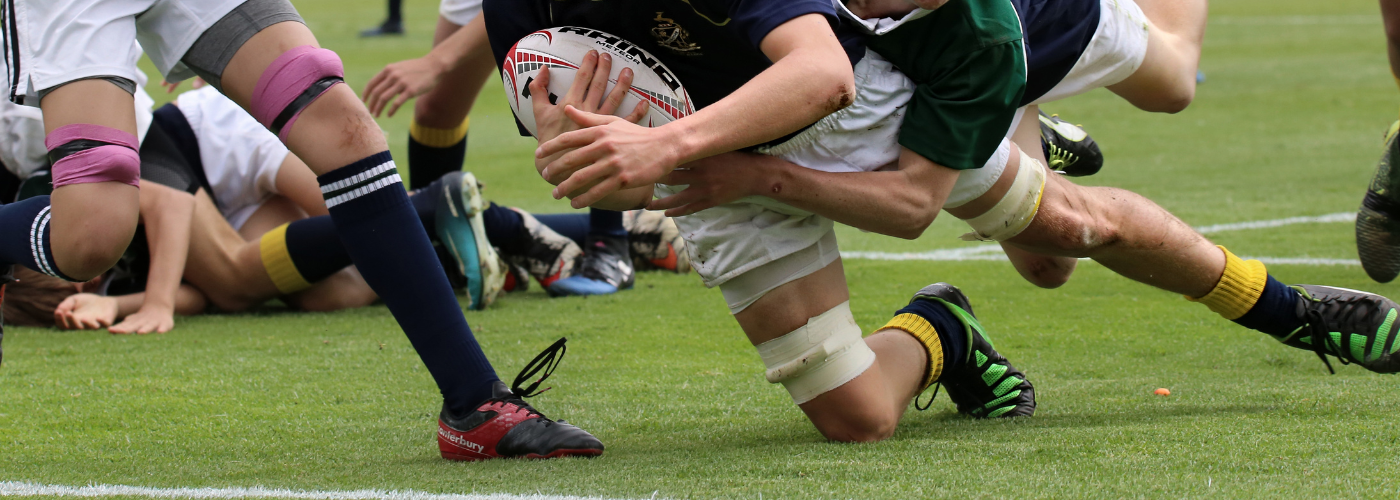Sportwortschatz auf Englisch lernen
Das englische Sportvokabular umfasst eine Sammlung von Wörtern und Sätzen, die üblicherweise verwendet werden, um verschiedene Sportarten, sportliche Aktivitäten, Wettbewerbe und verwandte Begriffe in der englischen Sprache zu diskutieren. Diese Begriffe umfassen die Namen von Sportarten, die verwendete Ausrüstung, Regeln und Vorschriften, Spielerpositionen, Techniken, Strategien und andere Aspekte, die mit Sport und körperlichen Aktivitäten verbunden sind.
Englische Wortschatzlisten zum Thema Sport für Fortgeschrittene
Stell dir vor, du verbringst ein Auslandsjahr in England und wirst zu einem Spiel der Premier League eingeladen. Dann solltest du gut vorbereitet sein, denn du wirst dich mit deinen englischen Freunden sicherlich über das Spiel unterhalten wollen. Um dir dabei zu helfen, haben wir die wichtigsten englischen Sportbegriffe herausgesucht und dir die englische Definition gegeben. So kannst du deinen fortgeschrittenen englischen Wortschatz mit dem Thema Sportbegriffe effektiv erweitern.
Wenn Fußball nichts für dich ist, haben wir auch noch ein paar Begriffe aus anderen Sportarten herausgesucht.

Häufig verwendete Begriffe im Sportvokabular
| Word | Explanation |
|---|---|
| Athlete | A person who participates in sports or athletic activities. |
| Team | A group of players or athletes who compete together against another group. |
| Coach | A person who trains and guides athletes or a sports team. |
| Match | A game or competition between two individuals or teams. |
| Tournament | A series of matches or games where participants compete for a championship or prize. |
| Score | The number of points or goals achieved by a team or individual in a game. |
| Victory | Winning a game or competition. |
| Defeat | Losing a game or competition. |
| Championship | The highest level of competition or title in a sport. |
| Referee | An official who enforces the rules during a game and makes decisions on fouls or violations. |
| Stadium | A large sports venue or arena where games or events take place. |
| Fan | A supporter or enthusiast of a particular sports team or athlete. |
| Equipment | The tools, gear, or apparatus used in a sport, such as a ball, racket, or helmet. |
| Training | The process of practicing and preparing for a sport or competition. |
| Fitness | Physical condition and health required for sports performance. |
| Teammate | A fellow member of a sports team. |
| Goal | An objective or target in a game that teams or individuals aim to achieve. |
| Offside | A rule in certain sports (e.g., soccer) where an attacking player is in an unauthorized position when the ball is played to them. |
| Penalty | A punishment or consequence given for breaking the rules in a sport. |

Fußball-Vokabeln lernen
| Word | Explanation |
|---|---|
| Goalkeeper | The player positioned in front of the goal who defends it from the opposing team's attempts to score. |
| Forward | A player positioned closer to the opponent's goal, typically responsible for scoring goals and creating attacking opportunities. |
| Midfielder | A player positioned in the middle of the field, responsible for both defensive and offensive play, linking the defense and attack. |
| Defender | A player positioned in the defensive line, responsible for preventing the opposing team from scoring goals and protecting their own goal. |
| Penalty kick | A free kick awarded to a team when a foul is committed inside the opponent's penalty area, taken from the penalty spot and defended only by the opposing goalkeeper. |
| Offside | A rule that states an attacking player cannot be closer to the opponent's goal line than the ball and the second-to-last defender when the ball is played to them. |
| Corner kick | A set-piece restart where the attacking team kicks the ball from the corner arc of the field, usually aiming to create a scoring opportunity. |
| Yellow card | A cautionary card shown by the referee to a player as a warning for committing a foul or displaying unsporting behavior. |
| Red card | A card shown by the referee to signal a player's dismissal from the game due to a serious foul, violent conduct, or receiving two yellow cards. |
| Extra time | Additional playing time added to a match when the score is tied at the end of regulation time, typically to determine a winner in knockout competitions. |
| Hat-trick | When a player scores three goals in a single game. |
| Tackle | A defensive move where a player attempts to take the ball away from an opponent by cleanly intercepting it with their foot. |
| Dribble | The act of moving the ball forward while maintaining control by skillfully maneuvering around opponents. |
| Formation | The strategic arrangement of players on the field, indicating their positions and roles within the team's tactical setup. |
| Counterattack | A fast offensive maneuver initiated by the defending team immediately after winning possession of the ball. |

Tennis-Vokabeln lernen
| Word | Explanation |
|---|---|
| Serve | The act of hitting the ball to start a point. The server stands behind the baseline and aims to get the ball into the opponent's service box. |
| Forehand | A stroke made with the palm of the hand facing forward, typically executed on the dominant side of the body for right-handed players. |
| Backhand | A stroke made with the back of the hand facing forward, typically executed on the non-dominant side of the body for right-handed players. |
| Volley | Hitting the ball in mid-air before it bounces on the ground, usually near the net. It is an offensive shot often used when players are close to the net. |
| Smash | A forceful overhead shot aimed to hit the ball with power and accuracy downward towards the opponent's court, usually executed when the ball is high in the air. |
| Deuce | A situation in which both players or teams have won three points each in a game. The next point after deuce is called advantage. |
| Love | A term used to represent a score of zero in tennis. For example, "Love-15" means the serving player has zero points while the opponent has 15 points. |
| Set | A unit of scoring in tennis. A set is won by the player or team who first wins six games with a difference of at least two games. |
| Tiebreak | A special game played to determine the winner of a set when the games are tied at 6-6. The first player or team to reach seven points with a difference of at least two points wins the tiebreak. |
| Rally | A sequence of shots played back and forth between opponents during a point. |
| Drop shot | A softly hit shot that is intended to land close to the net on the opponent's side, often used to surprise the opponent and slow down the pace of the game. |
| Ace | A serve that the opponent fails to touch with their racket, resulting in the serving player winning the point outright. |
| Fault | An unsuccessful serve that lands outside the correct service box or fails to clear the net. |
| Let | A situation in which a served ball touches the net and still lands within the correct service box, resulting in a replay of the serve. |
| Baseline | The back boundary line of the court, parallel to the net, from which players serve and return the ball. |
Effektives Lernen des englischen Wortschatzes
Du bist auf der Suche nach weiteren englischen Vokabeln zum Lernen? Hier wirst du fündig!

Volleyball-Vokabeln lernen
| Word | Explanation |
|---|---|
| Serve | The act of initiating play by hitting the ball from behind the back boundary line into the opponent's court to start a rally. |
| Spike | A powerful offensive shot where a player jumps and forcefully hits the ball downward into the opponent's court. |
| Block | A defensive move where a player jumps near the net to intercept and deflect an opponent's attack back into their court. |
| Set | The overhead pass used to set up a teammate for an attack. It involves placing the ball accurately for the hitter to strike. |
| Dig | A defensive technique used to receive a spiked or hard-driven ball by diving or using a forearm pass to control the ball. |
| Rotation | The clockwise movement of players around the court after a team wins a rally and earns the right to serve. |
| Libero | A specialized defensive player wearing a different colored jersey, who is allowed to replace any back-row player without counting as a substitution. |
| Side-out | When the serving team fails to win the rally, resulting in a point for the receiving team and a change of serve. |
| Ace | A serve that lands in the opponent's court untouched or is received but cannot be kept in play, resulting in an immediate point for the serving team. |
| Rally | A sequence of plays, including passes, sets, attacks, blocks, and digs, that occur between the teams until the ball hits the floor or a fault is committed. |
| Rotation error | A violation that occurs when players are out of their correct rotational order during service reception. |
| Block touch | When a blocker makes contact with an attacking ball, causing it to change direction or slow down, but it is still playable. |
| Antenna | Vertical rods attached to the net near the sidelines, used to determine whether the ball is in bounds during play. |
| Joust | When two opposing players simultaneously contact the ball at the net, resulting in a struggle for control. |
| Match point | The final point needed to win a set or match. |

Rugby-Wortschatz
| Word | Explanation |
|---|---|
| Scrum | A method of restarting play after a minor infringement, involving players from both teams pushing against each other to gain possession of the ball. |
| Try | A scoring play in which a player grounds the ball in the opponent's in-goal area behind the try line, worth five points. |
| Conversion | A kick taken after a try is scored, worth two points if successful, where the ball is kicked between the goalposts and over the crossbar. |
| Lineout | A method of restarting play after the ball goes out of bounds, where players from both teams line up and compete to catch a thrown-in ball. |
| Ruck | A phase of play that occurs after a tackle, where players from both teams bind together over the ball on the ground, attempting to secure possession. |
| Maul | A phase of play similar to a ruck, but with the ball carrier and tackler remaining on their feet, with other players from both teams binding onto them. |
| Penalty | A free kick awarded to a team due to an infringement by the opposing team, usually taken as a kick to gain territory or kick for goal. |
| Scrum-half | The player who feeds the ball into the scrum and often acts as a link between the forwards and backs. |
| Fly-half | A key playmaker positioned behind the scrum, responsible for directing the team's attacking play and often taking on kicking duties. |
| Tackle | The act of bringing an opponent to the ground by grabbing and wrestling them below the shoulders. |
| Knock-on | A handling error that occurs when a player accidentally knocks the ball forward with their hands or arms, resulting in a scrum for the opposing team. |
| Drop goal | A method of scoring where a player drops the ball onto the ground and kicks it as it bounces up, worth three points if successful. |
| Breakaway | A player, typically a forward, who has the speed and agility to break away from the opposition and make ground with the ball. |
| Fullback | The player positioned at the back of the defensive line, responsible for catching high kicks, organizing the defense, and launching counterattacks. |
| Forward pass | A violation that occurs when a player throws or passes the ball forward to a teammate, resulting in a scrum for the opposing team. |

Cricket-Wortschatz
| Word | Explanation |
|---|---|
| Wicket | The set of three stumps (vertical posts) topped by two bails (horizontal bars) that the batsman defends and the bowler attempts to hit. |
| Batting | The act of a batsman trying to score runs by hitting the ball with a cricket bat. |
| Bowling | The act of a bowler delivering the ball towards the batsman with the intention of dismissing them. |
| Run | A unit of scoring in cricket, where the batsmen run between the wickets after hitting the ball to score points. |
| Boundary | The edge of the playing area, typically marked by a rope or a fence. Scoring runs by hitting the ball to or over the boundary results in four or six runs, respectively. |
| Innings | A period of batting by a team, usually ending after ten wickets are taken or a predetermined number of overs are bowled. |
| Duck | When a batsman is dismissed without scoring any runs. |
| LBW (Leg Before Wicket) | A method of dismissal where the umpire determines that the ball would have hit the stumps if it had not struck the batsman's leg first. |
| Yorker | A delivery bowled by the bowler that pitches right at the batsman's feet, making it difficult to play and often aimed at hitting the base of the stumps. |
| Spin Bowling | A type of bowling where the ball is delivered with spin, causing it to deviate off the pitch after bouncing. |
| Fielding | The act of players in the fielding team trying to prevent the batsmen from scoring runs and taking wickets by catching the ball or fielding it cleanly. |
| Fielder | A player in the fielding team who attempts to catch the ball or stop it from reaching the boundary. |
| Umpire | The officials responsible for making decisions during a cricket match, including judging appeals, signaling boundaries, and declaring dismissals. |
| Crease | The lines marked on the pitch, indicating the safe areas where the batsman must ground their bat to avoid being run out. |
| Appeal | A request made by the fielding team to the umpire(s) to declare a batsman out, usually for a catch or LBW. |











